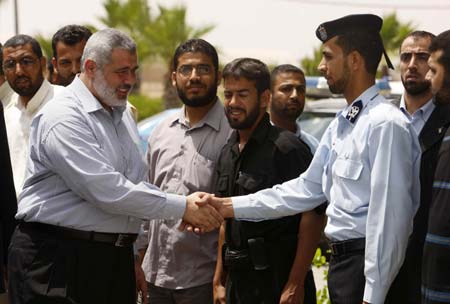By Saud Abu Ramadan
The two Palestinian rivals Fatah and Islamic Hamas have agreed to hold a last round of talks on July 25 and sign a final agreement on July 28.
Although it means they would miss a unity agreement deadline set by Egypt on July 7, it does not mean the dialogue has failed.
 |
|
Senior Hamas leader Ismail Haniyeh (L) shakes hands with a Hamas policeman during his visit to the Rafah border crossing in the southern Gaza Strip June 27, 2009.[Xinhua] |
During the sixth round of dialogue session held in Cairo in June 28 for three days, the two groups' leaders spoke in positive and encouraging atmosphere. However, they still disagree over tiny details related to political hostages, Gaza joint security force and the alternative factional committee.
Senior Fatah negotiator Azzam el-Ahmed told the Ramallah-based al-Ayyam Daily "there was no possibility of reaching an understanding on what we had agreed upon and what we had disagreed upon due to differences over drafting an agreement, mainly on substantial words and expressions."
The Egyptian sponsor has immediately intervened and told the two groups' conferees that Egypt would give them a last opportunity to seriously end their disagreements and return back to Cairo on July 25. Egypt then would hold a comprehensive session in Cairo to officially sign an agreement on July 28.
"Truthfully, there was progress made in some forms, but we faced obstacles in other forms, mainly choosing the right words and expressions in the text. We were so careful in writing the forms of the agreement because every expression has its influential meaning," said el-Ahmed.
Rivals trading accusations
Right after the sixth round of dialogue ended, the two rival groups' leaders get back to trading accusations that each side is fully responsible for missing a reconciliation agreement deadline set by Egypt to be signed on July 7 and also for not softening their stances.
Ismail Radwan, a senior Islamic Hamas movement official in Gaza told Xinhua that "the major reason for the delay in reaching a final agreement was Fatah movement's commitments to its stances, mainly in the security subject, and also the inflexibility towards the political-motivated arrests."
He accused Fatah movement of rejecting all the formulations suggested by the committee to end all kinds of political arrests, adding that "accordingly, Fatah just wanted to implement the merits for the Zionist occupation and the international community."
Faisal Abu Shahla, a Gaza Fatah lawmaker, defended his movement's stance and said "the debates in Cairo had mainly focused on Gaza joint security forces and the system of the upcoming elections, adding "unfortunately, Hamas still rejects all the proposals related to the two issues."
He added that the political arrests issue "is not a big deal to obstruct the dialogue and be the reason for delaying an agreement, and it can be easily resolved. Hamas forgets that arrests are not only taking place in the West Bank, but are also going on against Fatah members in the Gaza Strip."
Despair among Palestinians
However, both Fatah and Hamas leaders agreed on the fact that keeping the dialogue going on without reaching a final agreement would mount depression among the Palestinians, mainly in the Hamas-ruled Gaza Strip, which has been suffering from more than two years of Israeli blockade.
"Delaying the signing of a reconciliation agreement that ends the current political rift between Gaza and the West Bank would for sure negatively affect the Palestinian street," said Abu Shahla, adding, "this means that depression is getting higher, and would lead to extra pressure on the Palestinians."
Radwan also said that "there is no doubt that the Palestinians have patiently waited for a final agreement, while the delay would cause more depression among them. We hope that Fatah movement will work according to the national agenda instead of according to the foreign one."
Not enough goodwill for agreement?
Hani Habib, a Palestinian academic at al-Azhar University in Gaza said that postponing the agreement indicates that Egypt did not get enough Arab support to press on the rival factions to end their political crisis, and also, both quarrelling sides don't have the real goodwill to reach an agreement."
But Yasser al-Wadiya, leader of the Palestinian independent figures, denied that the dialogue had failed, and said, "so far, we can't talk about a failure because lots of things have been achieved except some remaining disagreements related to drafting the deal."
"Everyone was expecting that a deal was to be signed on July 7, but we can't say that postponing the agreement until July 28 was a failure, because so many files have been resolved," said al-Wadiya, who couldn't deny that despair among the Palestinians had mounted.
(Xinhua News Agency July 2, 2009)